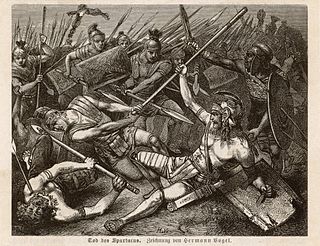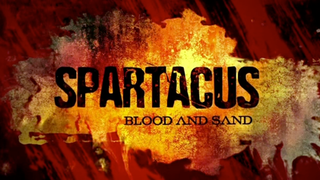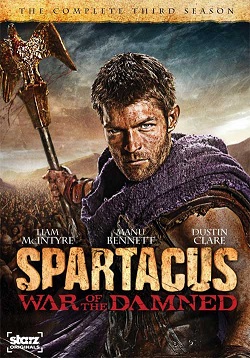This article concerns the period 79 BC – 70 BC.

Year 72 BC was a year of the pre-Julian Roman calendar. At the time it was known as the Year of the Consulship of Publicola and Lentulus. The denomination 72 BC for this year has been used since the early medieval period, when the Anno Domini calendar era became the prevalent method in Europe for naming years

The Third Servile War, also called the Gladiator War and the War of Spartacus by Plutarch, was the last in a series of slave rebellions against the Roman Republic known as the Servile Wars. This third rebellion was the only one that directly threatened the Roman heartland of Italy. It was particularly alarming to Rome because its military seemed powerless to suppress it.
Gnaeus Cornelius Lentulus Vatia was the Roman owner of a gladiatorial school in ancient Capua. It was from this school that, in 73 BC, the Thracian slave Spartacus and about 70 to 78 followers escaped. The breakout led to the slave rebellion known as the Third Servile War.
Spartacus is a historical novel by the Scottish writer Lewis Grassic Gibbon, first published in 1933 under his real name of James Leslie Mitchell.
Crixus was a Gallic gladiator and military leader in the Third Servile War between the Roman Republic and rebel slaves. Born in Gaul, he was enslaved by the Romans under unknown circumstances and trained as a gladiator in Capua. His name means "one with curly hair" in Gaulish.

The Gladiators (1939) is the first novel by the author Arthur Koestler; it portrays the effects of the Spartacus revolt in the Roman Republic. Published in 1939, it was later reprinted in other editions.
Oenomaus was a Gallic gladiator, who escaped from the gladiatorial school of Lentulus Batiatus in Capua. Together with Spartacus, Crixus, Castus, and Gannicus, he became one of the leaders of rebellious slaves during the Third Servile War

Spartacus is a 2004 North American miniseries directed by Robert Dornhelm and produced by Ted Kurdyla from a teleplay by Robert Schenkkan. It aired over two nights on the USA Network, and stars Goran Visnjic, Alan Bates, Angus Macfadyen, Rhona Mitra, Ian McNeice, Ross Kemp and Ben Cross. It is based on the 1951 novel of the same name by Howard Fast.

Spartacus was a Thracian gladiator (Thraex) who was one of the escaped slave leaders in the Third Servile War, a major slave uprising against the Roman Republic.

Spartacus: Blood and Sand is the first season of American television series Spartacus, which premiered on Starz on January 22, 2010. The series was inspired by the historical figure of Spartacus, a Thracian gladiator who from 73 to 71 BC led a major slave uprising against the Roman Republic. Executive producers Steven S. DeKnight and Robert Tapert focused on structuring the events of Spartacus' obscure early life leading up to the beginning of historical records.

Spartacus: Gods of the Arena is a television miniseries broadcast by American cable TV Starz, as a prequel to Spartacus, which premiered in 2011. The series follows the character Gannicus, the first gladiator representing Lentulus Batiatus to become Champion of Capua. Cast members and characters reprised from the original series include John Hannah as Batiatus, Lucy Lawless as Lucretia, Peter Mensah as Oenomaus, Nick E. Tarabay as Ashur, Lesley-Ann Brandt as Naevia, Antonio Te Maioha as Barca, and Manu Bennett as Crixus.

Spartacus: Vengeance is the second season of the American television series Spartacus, a Starz television series, which follows Spartacus: Blood and Sand. It premiered on January 27, and concluded on March 30, 2012. Its story follows Spartacus, after he and his fellow gladiators kill their master Batiatus and escape from his ludus, or gladiatorial training school. Cast members and characters who return from the first season include Lucy Lawless as Lucretia, Peter Mensah as Oenomaus, Manu Bennett as Crixus, Dan Feuerriegel as Agron, Nick E. Tarabay as Ashur, Viva Bianca as Ilithyia, and Craig Parker as Gaius Claudius Glaber. Dustin Clare also reprises his role as Gannicus from Spartacus: Gods of the Arena, the prequel to Spartacus: Blood and Sand.
Spartacus is an American historical drama television series filmed in New Zealand that premiered on Starz on January 22, 2010, and concluded on April 12, 2013. The fiction series was inspired by the historical figure of Spartacus, a Thracian gladiator who from 73 to 71 BC led a major slave uprising against the Roman Republic departing from Capua. Executive producers Steven S. DeKnight and Robert Tapert focused on structuring the events of Spartacus' obscure early life leading up to the beginning of historical records.

Spartacus: War of the Damned is the third and final season of the American television series Spartacus, a Starz television series, which follows Spartacus: Vengeance. The series was inspired by the historical figure of Spartacus, a Thracian gladiator who, from 73 to 71 BC, led a major slave uprising against the Roman Republic. It premiered on January 25, 2013, and concluded on April 12, 2013.
Gannicus was a Celtic slave, who together with the Thracian Spartacus, Crixus, Castus and Oenomaus, became one of the leaders of rebel slaves during the Third Servile War. In the winter of 71 BC, Gannicus, along with Castus, broke off from Spartacus, taking a large number of Celts and Germans with them, marking the second detachment of the rebellion. Gannicus and Castus met their end at the Battle of Cantenna in Lucania near Mount Soprano, where Marcus Licinius Crassus, Lucius Pomptinus and Quintus Marcius Rufus entrenched their forces in battle and defeated them.

The Battle of Vesuvius was the first conflict of the Third Servile War which pitted the escaped slaves against a military force of militia specifically dispatched by Rome to deal with the rebellion.

The Gladiator is a tragic melodrama in five acts written by Robert Montgomery Bird originally starring Edwin Forrest. It first premiered on September 26, 1831, at the Park Theatre in New York City.

The Battle of Picenum was one of the major battles of the Third Servile War, between the slave army of Spartacus and the combined consular forces of the Roman Republic led by the two consuls Lucius Gellius and Gnaeus Cornelius Lentulus Clodianus. It took place in Picenum region in 72 BC. It was a victory for Spartacus, and it proved to be his greatest triumph of the war.











